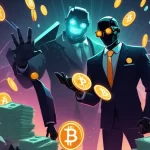Convicted Undead Apes NFT Scammer Dies by Suicide Before Sentencing

Tragic End for Convict in $400,000 Undead Apes NFT Fraud
In a shocking turn of events, 21-year-old Burman Jerry Nowlin, convicted in the $400,000 Undead Apes NFT fraud, took his own life just weeks before his scheduled sentencing on December 21, 2024. Alongside his co-conspirator Devin Alan Rhoden, Nowlin was found guilty of wire fraud and money laundering in November 2024. The scam involved minting two Solana NFT collections and abruptly canceling a third, defrauding investors with false promises of high returns and nonexistent partnerships. Nowlin faced up to five years in prison, while Rhoden’s sentencing remains set for January 2025.
- Burman Jerry Nowlin, 21, convicted in Undead Apes NFT fraud, dies by suicide before sentencing.
- Devin Alan Rhoden, co-conspirator, also convicted; sentencing scheduled for January 2025.
- Scam involved selling two Solana NFT collections, defrauding investors of $400,000.
The Undead Apes NFT fraud serves as a stark reminder of the dark side of the crypto world, where the allure of quick riches can lead to devastating consequences. Nowlin, known online as Repulse and Zayous, and Rhoden, known as Denny and Deviinz, masterminded a scheme that exploited the hype surrounding NFTs. By minting “UndeadApes” and “Undead Lady Apes” on the Solana blockchain—a type of digital platform where NFTs can be created and traded—they lured investors with promises of special benefits and partnerships that never materialized. The rug pull, a term for when creators abandon a project and take investors’ money, came with the sudden cancellation of “Undead Tombstone” NFTs, leaving investors out in the cold.
The tragic end to Nowlin’s life underscores the psychological toll that legal repercussions can have on those involved in such scams. It’s a somber reminder that behind the headlines of fraud and financial loss, there are real human stories. As the crypto community continues to grapple with these issues, it’s crucial to recognize the severe impact of facing justice for such crimes.
The Undead Apes scam is not an isolated incident but part of a broader wave of NFT frauds that have rocked the industry. These schemes exploit the enthusiasm and sometimes the naivety of investors, promising returns that are too good to be true. The case has drawn the attention of law enforcement agencies like the Department of Homeland Security Investigations (HSI) Tampa, the U.S. Air Force Office of Special Investigations, and the Department of Defense Office of Inspector General, highlighting the growing effort to combat cryptocurrency frauds.
John Dumas, HSI Tampa Assistant Special Agent in Charge, emphasized the deceptive nature of the scam and the sophisticated methods used to launder the funds, including “chain-hopping”—moving funds across different blockchains to obscure their trail—and the use of Tornado Cash, a tool designed to enhance privacy but often used for laundering. These methods pose significant challenges to law enforcement and underscore the need for vigilance and stronger regulatory measures to protect investors.
As we reflect on this tragic case, it’s important to consider how investors can safeguard themselves against similar scams. Due diligence, understanding the risks, and recognizing red flags like exaggerated promises and sudden project terminations are crucial steps in navigating the volatile world of NFTs and cryptocurrencies. For more insights on avoiding such frauds, visit Quora’s discussion on the topic.
While the crypto space, including Bitcoin and other decentralized technologies, holds immense potential for disrupting traditional finance and fostering greater financial freedom, cases like the Undead Apes scam highlight the challenges that come with decentralization. The lack of centralized oversight can enable fraudulent activities, yet it’s precisely this freedom from control that drives innovation and the ethos of “effective accelerationism” (e/acc), pushing the boundaries of what’s possible in finance and technology.
It’s worth playing devil’s advocate here to acknowledge that NFTs, despite their association with scams, have legitimate uses and potential. They can represent digital ownership of art, music, and even real-world assets, offering creators new ways to monetize their work and engage with their audiences. However, the industry needs to mature and implement stronger safeguards to prevent fraud and protect investors. For a detailed discussion on the scam, check out Reddit’s community insights.
In the wild west of NFTs, it seems the only thing undead is the scam itself. But as we mourn the loss of Nowlin, let’s also remember the broader impact of these scams on investors and the industry. It’s a call to action for all of us to stay informed, vigilant, and skeptical in the face of promises that sound too good to be true.
Key Questions and Takeaways
What was the Undead Apes NFT fraud?
The Undead Apes NFT fraud was a scam involving the sale of two Solana NFT collections, with false promises of high returns and partnerships that never existed, defrauding investors of $400,000.
Who was involved in the Undead Apes NFT fraud?
Burman Jerry Nowlin and Devin Alan Rhoden were the key individuals convicted in the Undead Apes NFT fraud.
What happened to Burman Jerry Nowlin before his sentencing?
Burman Jerry Nowlin committed suicide on December 21, 2024, just weeks before his scheduled sentencing in January 2025.
What charges were Nowlin and Rhoden facing?
They were facing federal charges of wire fraud—a type of scam where someone uses electronic communication to deceive others and steal money—and money laundering, which involves hiding the source of illegally obtained money.
What is the current status of Devin Alan Rhoden’s case?
Devin Alan Rhoden’s sentencing remains scheduled for January 2025.
What potential sentence was Nowlin facing?
Nowlin was facing up to five years in federal prison.
How did the Undead Apes NFT fraud deceive investors?
The scam deceived investors with misleading claims about partnerships with well-known businesses and promises of special benefits for buyers, which were false.



